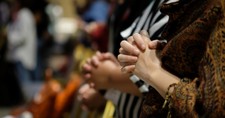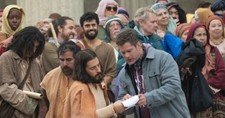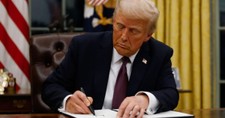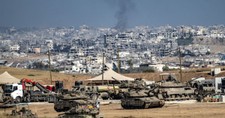
Trending Articles
Recent News
Elevation Rhythm on Thousands of Students Meeting Jesus and the UniteUS Movement Sweeping College Campuses Kirk Cameron Plans Roundtable Discussion on Hell Doctrine after Criticism Western Civilization Faces Growing ‘Clash’ With Islamic Worldview, Mohler Warns Hobby Lobby Declares ‘Jesus Is the Gift’ in Full-Page Newspaper Ads Cultivating Christmas Wonder Loss, Survival, Resilience, and Contemporary Antisemitism 15 Years After the Terror Attack in Which She Was Nearly Killed 4 Ways ‘David’ Recaptures the Power of ‘The Prince of Egypt’ 14-Year-Old Praises Jesus on ‘The Voice’ With Worship-Filled Forrest Frank Song Hobby Lobby Distributes 500,000 Free Copies of Lee Strobel’s ‘The Case for Christmas’ Zelenskyy Pushes Back on Trump Regarding Holding Elections During Wartime Art and Storytelling in a Time of ‘Desecration’ Paul Walter Hauser Isn’t Afraid to Stand for Jesus in Hollywood
Trending Articles
Recent News
Elevation Rhythm on Thousands of Students Meeting Jesus and the UniteUS Movement Sweeping College Campuses Kirk Cameron Plans Roundtable Discussion on Hell Doctrine after Criticism Western Civilization Faces Growing ‘Clash’ With Islamic Worldview, Mohler Warns Hobby Lobby Declares ‘Jesus Is the Gift’ in Full-Page Newspaper Ads Cultivating Christmas Wonder Loss, Survival, Resilience, and Contemporary Antisemitism 15 Years After the Terror Attack in Which She Was Nearly Killed 4 Ways ‘David’ Recaptures the Power of ‘The Prince of Egypt’ 14-Year-Old Praises Jesus on ‘The Voice’ With Worship-Filled Forrest Frank Song
Positive Stories
Celebrity
Video
Opinion
Church
Entertainment
Sports
Movies
Politics
Israel
Christian News Headlines - Breaking and Trending Religion News
Crosswalk Headlines - Christian news brought to you by a group of Christian writers and editors who are dedicated to creating a well-rounded look at what’s happening across the globe from a Christian worldview. Our vision is to inform and inspire productive discussion about the current events and online trends that shape our lives, our churches and our world.Crosswalk Headlines includes blog posts about current events and Christian media, breaking news, feature articles, and guest commentaries, many written by respected Christian thinkers.


































































